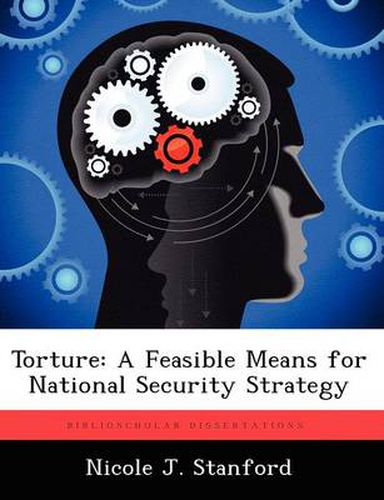Readings Newsletter
Become a Readings Member to make your shopping experience even easier.
Sign in or sign up for free!
You’re not far away from qualifying for FREE standard shipping within Australia
You’ve qualified for FREE standard shipping within Australia
The cart is loading…






This title is printed to order. This book may have been self-published. If so, we cannot guarantee the quality of the content. In the main most books will have gone through the editing process however some may not. We therefore suggest that you be aware of this before ordering this book. If in doubt check either the author or publisher’s details as we are unable to accept any returns unless they are faulty. Please contact us if you have any questions.
As a part of the response to the Al Qaida attacks on 11 September 2001, the United States found itself having to answer many difficult questions regarding its action in the Global War on Terrorism. One of the most contentious was the use of torture against captured enemy fighters. The United States, a strong proponent for humanitarian law, soon found itself criticized for its treatment of detainees. As a result, commentators and politicians have had endless debates about interrogation techniques and the legal applicability of international law and treaties to a nonstate enemy. The central research question derived from these issues is: Is torture a viable tool for use in achieving goals as outlined in the 2006 National Security Strategy? Interrogational torture was examined from the following standpoints: legal, effectiveness, and ethical. Results showed that torture is wrong. The next step applied the analytical results against the ethical decision-making triangle and also concluded that from the three standpoints torture was wrong and not a feasible means of achieving the United States’ national security objectives.
$9.00 standard shipping within Australia
FREE standard shipping within Australia for orders over $100.00
Express & International shipping calculated at checkout
This title is printed to order. This book may have been self-published. If so, we cannot guarantee the quality of the content. In the main most books will have gone through the editing process however some may not. We therefore suggest that you be aware of this before ordering this book. If in doubt check either the author or publisher’s details as we are unable to accept any returns unless they are faulty. Please contact us if you have any questions.
As a part of the response to the Al Qaida attacks on 11 September 2001, the United States found itself having to answer many difficult questions regarding its action in the Global War on Terrorism. One of the most contentious was the use of torture against captured enemy fighters. The United States, a strong proponent for humanitarian law, soon found itself criticized for its treatment of detainees. As a result, commentators and politicians have had endless debates about interrogation techniques and the legal applicability of international law and treaties to a nonstate enemy. The central research question derived from these issues is: Is torture a viable tool for use in achieving goals as outlined in the 2006 National Security Strategy? Interrogational torture was examined from the following standpoints: legal, effectiveness, and ethical. Results showed that torture is wrong. The next step applied the analytical results against the ethical decision-making triangle and also concluded that from the three standpoints torture was wrong and not a feasible means of achieving the United States’ national security objectives.